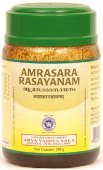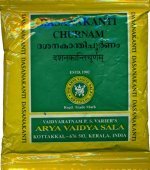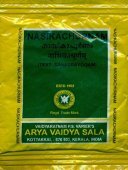Kaunti, Kauntī, Kaumti, Kauṃṭī: 12 definitions
Introduction:
Kaunti means something in Hinduism, Sanskrit, biology, Tamil. If you want to know the exact meaning, history, etymology or English translation of this term then check out the descriptions on this page. Add your comment or reference to a book if you want to contribute to this summary article.
In Hinduism
Purana and Itihasa (epic history)
Source: Cologne Digital Sanskrit Dictionaries: The Purana IndexKauntī (कौन्ती).—The city of, got into the hands of Mlecchas.*
- * Bhāgavata-purāṇa XII. 1. 39.

The Purana (पुराण, purāṇas) refers to Sanskrit literature preserving ancient India’s vast cultural history, including historical legends, religious ceremonies, various arts and sciences. The eighteen mahapuranas total over 400,000 shlokas (metrical couplets) and date to at least several centuries BCE.
Ayurveda (science of life)
Kalpa (Formulas, Drug prescriptions and other Medicinal preparations)
Source: Shodhganga: Edition translation and critical study of yogasarasamgrahaKauntī (कौन्ती) is another name for “Cavya” and is dealt with in the 15th-century Yogasārasaṅgraha (Yogasara-saṅgraha) by Vāsudeva: an unpublished Keralite work representing an Ayurvedic compendium of medicinal recipes. The Yogasārasaṃgraha [mentioning kauntī] deals with entire recipes in the route of administration, and thus deals with the knowledge of pharmacy (bhaiṣajya-kalpanā) which is a branch of pharmacology (dravyaguṇa).

Āyurveda (आयुर्वेद, ayurveda) is a branch of Indian science dealing with medicine, herbalism, taxology, anatomy, surgery, alchemy and related topics. Traditional practice of Āyurveda in ancient India dates back to at least the first millenium BC. Literature is commonly written in Sanskrit using various poetic metres.
Biology (plants and animals)
Source: Wisdom Library: Local Names of Plants and DrugsKaunti in the Sanskrit language is the name of a plant identified with Corchorus trilocularis L. from the Tiliaceae (Phalsa) family having the following synonyms: Corchorus aestuans, Corchorus fruticulosus, Corchorus triflorus. For the possible medicinal usage of kaunti, you can check this page for potential sources and references, although be aware that any some or none of the side-effects may not be mentioned here, wether they be harmful or beneficial to health.
Source: Google Books: CRC World Dictionary (Regional names)1) Kaunti in India is the name of a plant defined with Aconitum novoluridum in various botanical sources. This page contains potential references in Ayurveda, modern medicine, and other folk traditions or local practices It has the synonym Aconitum luridum Hook. f. & Thomson.
2) Kaunti is also identified with Corchorus trilocularis It has the synonym Corchorus trilocularis Burm. f., nom. illeg. (etc.).
Example references for further research on medicinal uses or toxicity (see latin names for full list):
· Gentes Herbarum (1945)
· Taxon (1979)
· Species Plantarum (1753)
· Flora Indica (1768)
· Flora Indica (1855)
· Bulletin de la Société Botanique de France (1922)
If you are looking for specific details regarding Kaunti, for example pregnancy safety, health benefits, side effects, diet and recipes, extract dosage, chemical composition, have a look at these references.

This sections includes definitions from the five kingdoms of living things: Animals, Plants, Fungi, Protists and Monera. It will include both the official binomial nomenclature (scientific names usually in Latin) as well as regional spellings and variants.
Languages of India and abroad
Sanskrit dictionary
Source: Cologne Digital Sanskrit Dictionaries: Shabda-Sagara Sanskrit-English DictionaryKauntī (कौन्ती).—f. (-ntī) A sort of perfume, commonly Renuka. E. kunti here said to mean a country, affixes aṇ and ṅīṣ; produced in that district.
Source: Cologne Digital Sanskrit Dictionaries: Monier-Williams Sanskrit-English Dictionary1) Kauntī (कौन्ती):—[from kauntika] f. ([from] kunta or ti), a sort of perfume, [Caraka vi, 17; Bhāvaprakāśa]
2) [v.s. ...] Name of a river, [Bhāgavata-purāṇa xii, 1, 37.]
Source: Cologne Digital Sanskrit Dictionaries: Yates Sanskrit-English DictionaryKauntī (कौन्ती):—(ntī) 3. f. A sort of perfume.
[Sanskrit to German]
Sanskrit, also spelled संस्कृतम् (saṃskṛtam), is an ancient language of India commonly seen as the grandmother of the Indo-European language family (even English!). Closely allied with Prakrit and Pali, Sanskrit is more exhaustive in both grammar and terms and has the most extensive collection of literature in the world, greatly surpassing its sister-languages Greek and Latin.
Kannada-English dictionary
Source: Alar: Kannada-English corpusKauṃti (ಕೌಂತಿ):—[noun] a particular drug or medicinal substance, said to be fragrant, but bitter and slightly pungent in taste, and of greyish colour.
Kannada is a Dravidian language (as opposed to the Indo-European language family) mainly spoken in the southwestern region of India.
Nepali dictionary
Source: unoes: Nepali-English DictionaryKauṃṭī (कौंटी):—[=कौँटी] n. making swoops in Kite flying;
Nepali is the primary language of the Nepalese people counting almost 20 million native speakers. The country of Nepal is situated in the Himalaya mountain range to the north of India.
See also (Relevant definitions)
Starts with: Kauntika, Kauntinagara.
Full-text: Abhishta.
Relevant text
Search found 6 books and stories containing Kaunti, Kaumti, Kauṃti, Kauṃṭī, Kaunthi, Kauntī; (plurals include: Kauntis, Kaumtis, Kauṃtis, Kauṃṭīs, Kaunthis, Kauntīs). You can also click to the full overview containing English textual excerpts. Below are direct links for the most relevant articles:
Amarakoshodghatana of Kshirasvamin (study) (by A. Yamuna Devi)
Flora (7): Shrubs < [Chapter 5 - Aspects of Nature]
The Agni Purana (by N. Gangadharan)
Chapter 302 - Description of different kinds of potential mantras and herbs
Chapter 343 - Definition of the embellishment of words (śabda-alaṅkāra)
Chapter 363 - The words denoting earth, city, forest and herbs
Atharvaveda and Charaka Samhita (by Laxmi Maji)
Unmāda (insanity) according to Caraka < [Chapter 4 - Diseases and Remedial measures (described in Caraka-saṃhitā)]
The Bhagavata Purana (by G. V. Tagare)
Chapter 1 - Dynasties of the Kali Age < [Book 12 - Twelfth Skandha]
Alamkaras mentioned by Vamana (by Pratim Bhattacharya)
3: Definition of Anuprāsa Alaṃkāra < [Chapter 3 - Śabdālaṃkāras mentioned by Vāmana]
The Vishnu Purana (by Horace Hayman Wilson)
Related products
(+1 more products available)





